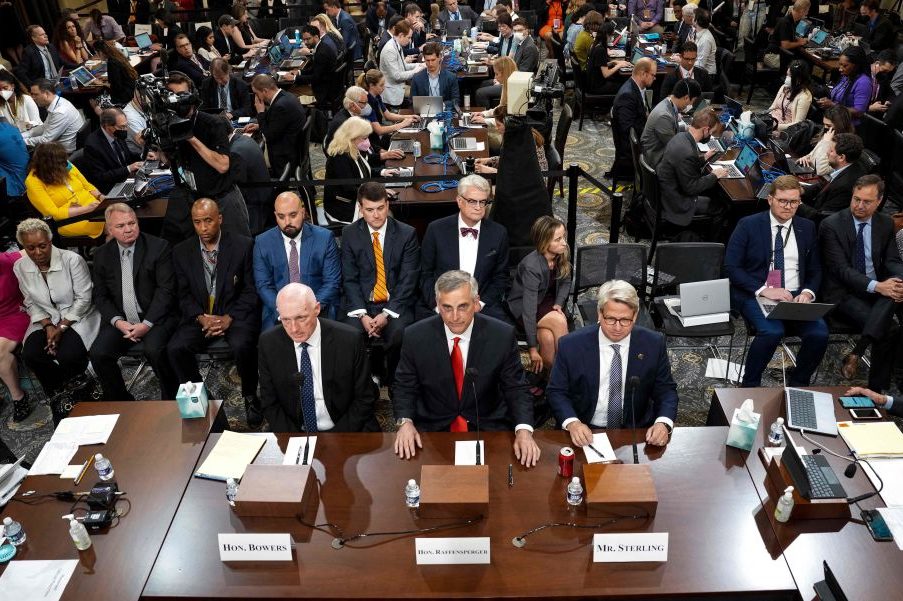The quiet significance of the January 6 hearings
The unexpected star of the fourth public hearing of the House January 6 Committee was a rock-ribbed conservative most Americans have never heard of. Arizona House Speaker Russell “Rusty” Bowers found himself before the committee, and the cameras, in Washington yesterday because of a series of calls he received from the Trump team after the 2020 election.
Bowers campaigned for Trump, but unlike the former president and his team, acknowledged that his side lost the 2020 election. In yesterday’s hearing he testified that Trump lawyer Rudy Giuliani and others pressured him to back a slate of rogue electors and subvert the will of Arizona voters. In his testimony, Bowers referred to the oath he swore to protect and defend the US Constitution with intense earnestness, and explained that he chose the Constitution over party. “It is a tenet of my faith that the Constitution is divinely inspired,” said an emotional Bowers. “I would not do it.” For standing up to Trump, Bowers has faced threats of violence that have made personal safety an everyday concern.
Bowers was not the only affecting witness called yesterday. Georgia election officials recounted the horrifying consequences of being singled out and accused of election fraud.
“There is nowhere I feel safe,” said Ruby Freeman. “The president of the United States is supposed to represent every American. Not to target one.”
Conventional wisdom dictates that the committee hearings will be a political nothing-burger. I’m not so sure. While Democrats’ plans to center their midterm campaign on the threats to democracy from “Ultra MAGA” Republicans look like a cynical ploy for which few voters are likely to fall, I suspect the hearings will be more consequential than many assume — especially when it comes to the internal dynamics of a GOP mulling its 2024 options. With sworn testimony from Trump’s senior officials, details of the threat faced by Mike Pence and now the accounts of those on the receiving end of Trumpworld’s stolen election accusations, it is abundantly clear just how much baggage a Trump 2024 bid brings with it.
Republicans will be watching — and taking note. If Pence runs, the former president’s treatment of his VP will be back in the spotlight and impossible to ignore. The hearings, coupled with Trump’s own insistence on talking about 2020, make the newer, shinier, comparatively baggage-free alternatives all the more appealing. January 6 may be very low on voters’ lists of worries. But that doesn’t mean the events that followed the 2020 election aren’t lurking in the background of American public life, altering the fortunes of those involved, and hampering a 2024 bid for re-election by the man at the center of it all.
*** Sign up to receive the DC Diary in your inbox on weekdays ***
The gas tax gimmick
Joe Biden is set to request a three-month gas tax holiday from Congress today. The move is both the latest acknowledgment of the obvious — that inflation poses a fatal political hazard to the president — and a demonstration of just how ineffectual his administration is in the face of that threat.
According to snap analysis by Marc Goldwein at the Committee for a Responsible Federal Budget, the measure would only reduce short-term inflation by less than 0.1 percent, increase inflation after three months by more than 0.1 percent and boost output by 0.002 percent. The administration that has spent months blaming big business for rising prices is now pushing a measure that, all serious economists agree, will benefit industry far more than it will benefit consumers.
But what else could Biden do? The administration is keen to emphasize that the president only has so much power in the fight against inflation. While there may not be a big button in the Oval Office labeled “reduce prices,” there are many things that the president could be doing but isn’t. That list includes: kiboshing any additional spending, saying no to student debt relief, making clear that no big Build Back Better-style packages are on the horizon and that he will work with Congress to find a way to bring the deficit down and clearing regulatory obstacles to boosting domestic energy production. But the president’s party is ideologically allergic to many of these confidence-boosting steps. So they won’t happen, and in the place of grown-up government we are served gimmicks like the gas tax.
DeSantis’s endorsement defiance
Much understandable attention is being afforded to Trump’s endorsements in this election cycle, with the power of the former president’s seal of approval an important test of his influence in the party. But there’s one 2022 candidate who stands out for his decision not to seek the Trump thumbs up: Florida governor Ron DeSantis. Politico reports that “according to four people connected to the governor and the former president, DeSantis has not asked Trump for a formal endorsement and isn’t planning to.”
With Florida turning ever redder and given his high approval ratings and popularity with the base, DeSantis has little to sweat about in his reelection bid. The interesting thing here isn’t that DeSantis doesn’t need Trump’s endorsement. It’s that he wants to make that face abundantly clear. To refuse to play the Trump endorsement game is a quiet assertion of his own power, and surely a sign of things to come in the burgeoning Sunshine State rivalry that many expect to define the 2024 Republican primary.
What you should be reading today
Karol Markowicz: Sunshine state of mind
Chadwick Moore: Run again, Hillary!
Cockburn: We must know the truth of the Colbert insurrection
Elizabeth Findell, Wall Street Journal: Uvalde classroom door wasn’t locked
David M. Drucker, Washington Examiner: The downfall of a MAGA conservative in Alabama
Josh Kraushaar, National Journal: Saying goodbye to National Journal
Poll watch
President Biden job approval
Approve: 39.6 percent
Disapprove: 54.9 percent
Net approval: -15.3 (RCP Average)
Is the country on the right track?
Right track: 24 percent
Wrong track: 70 percent (Rasmussen)























